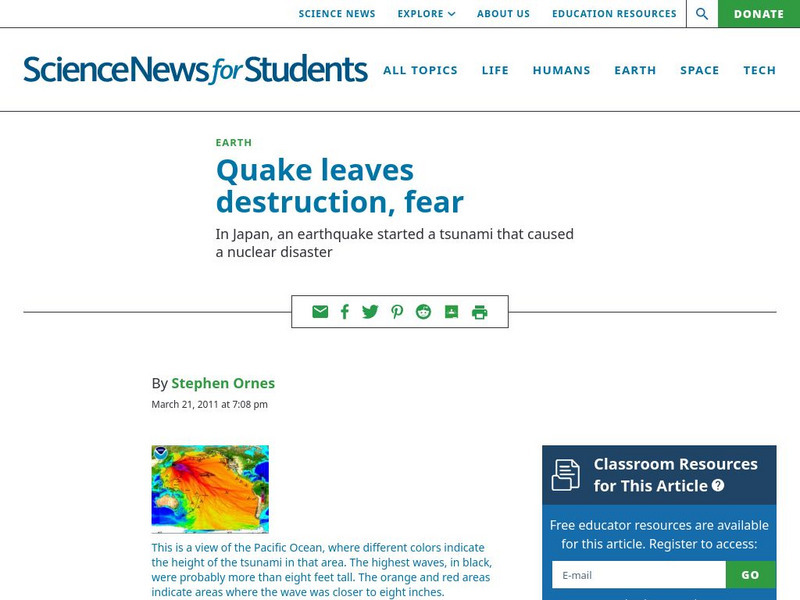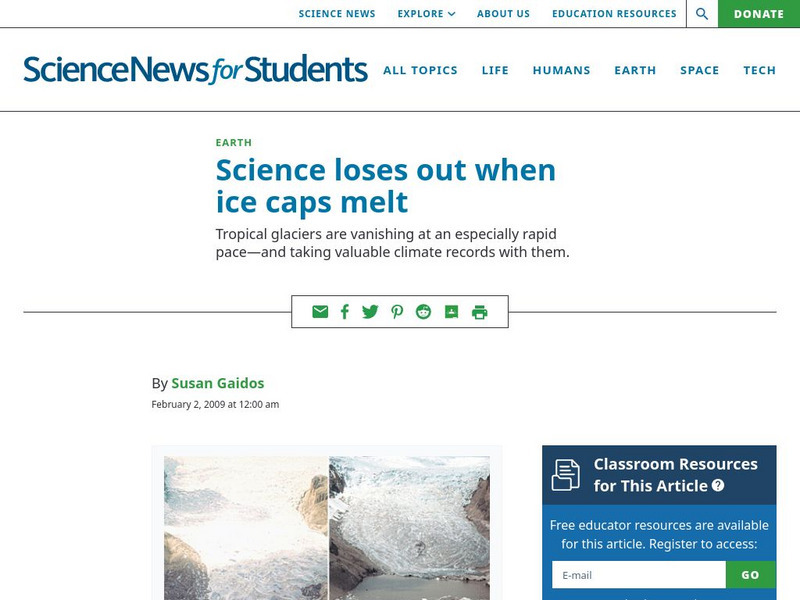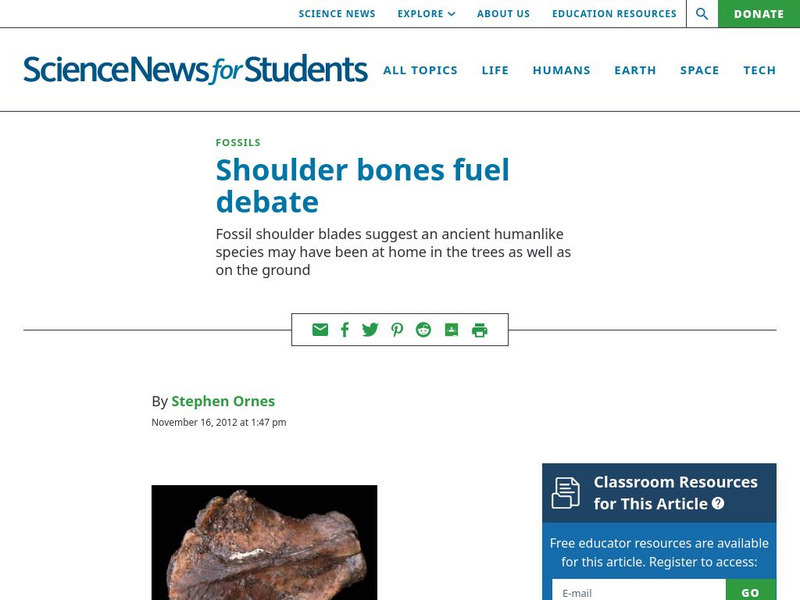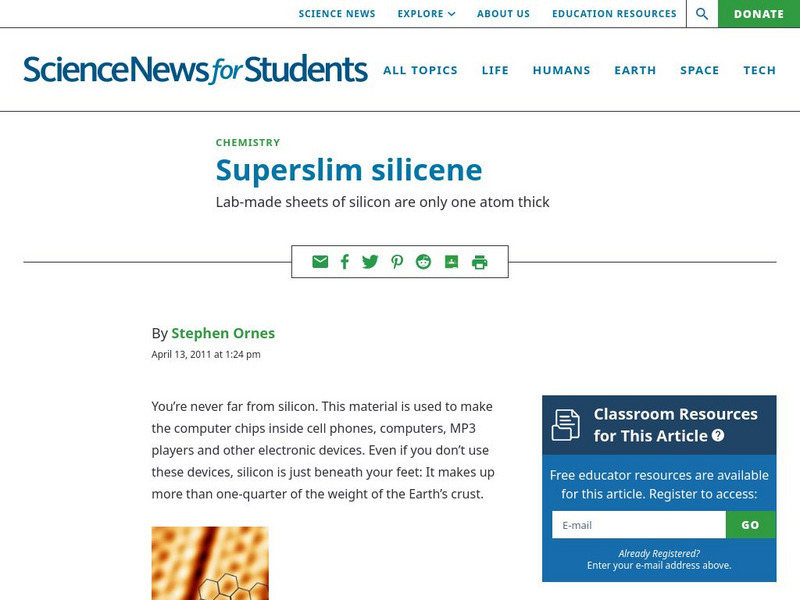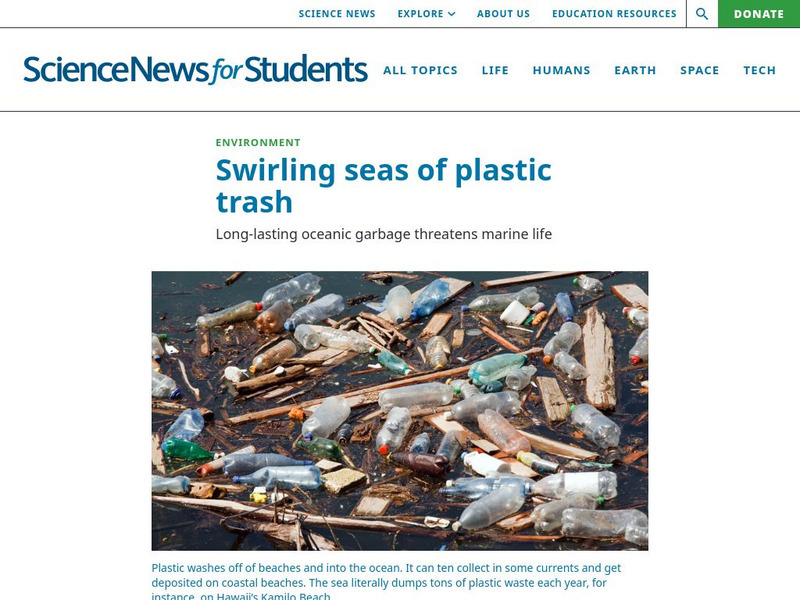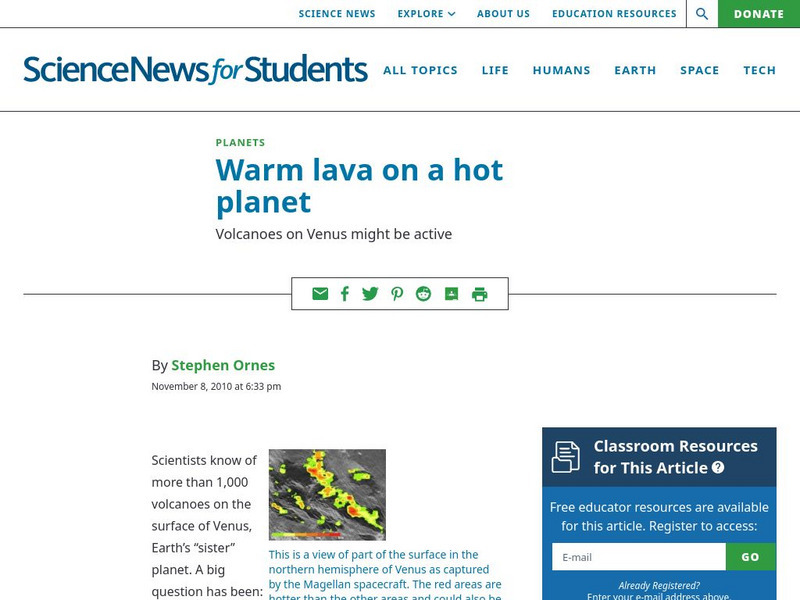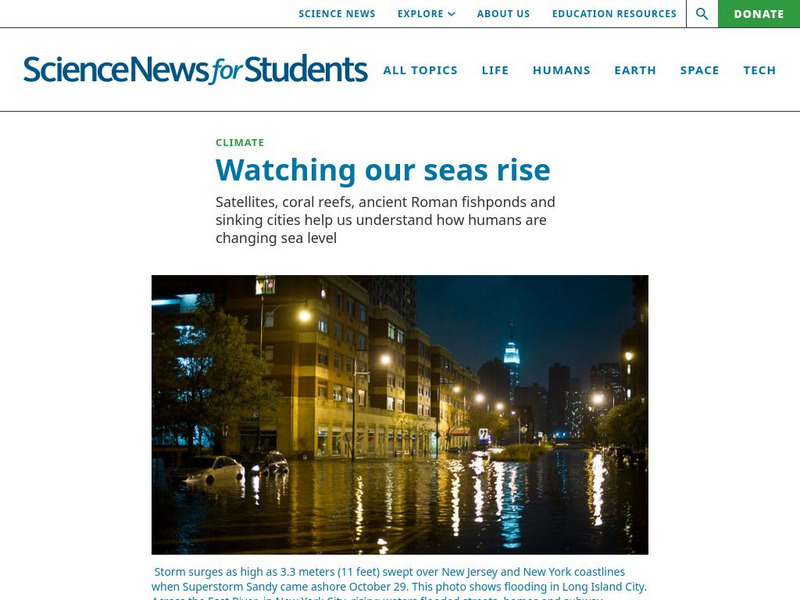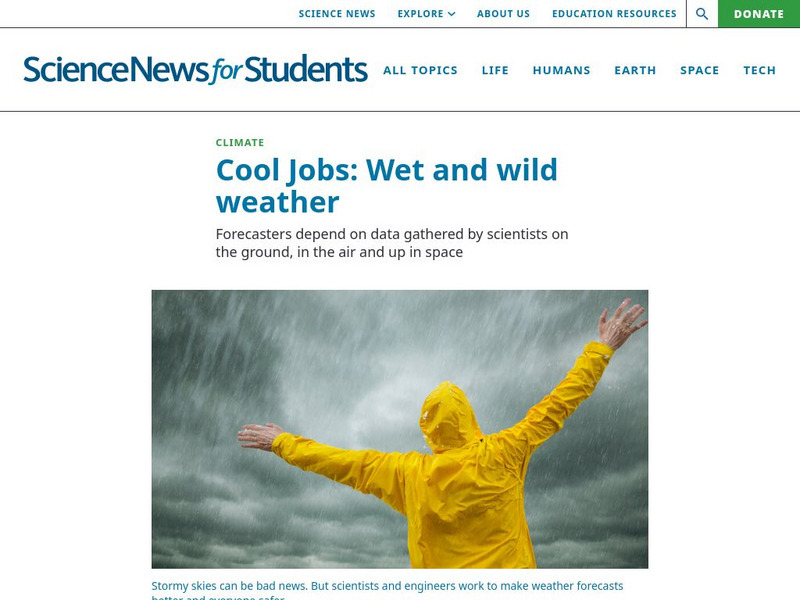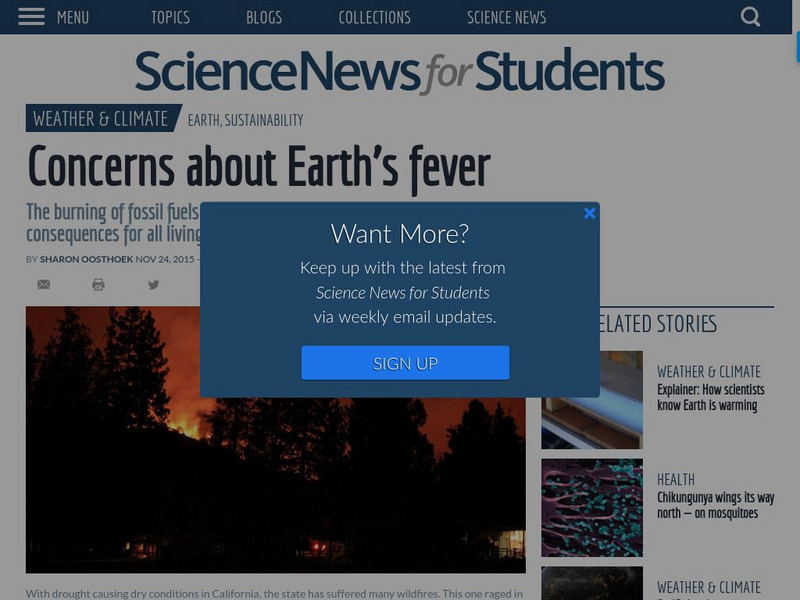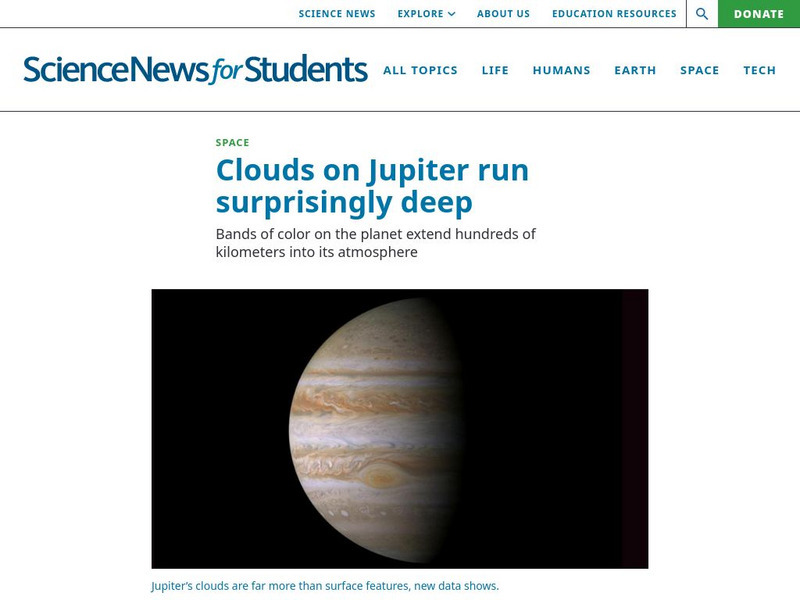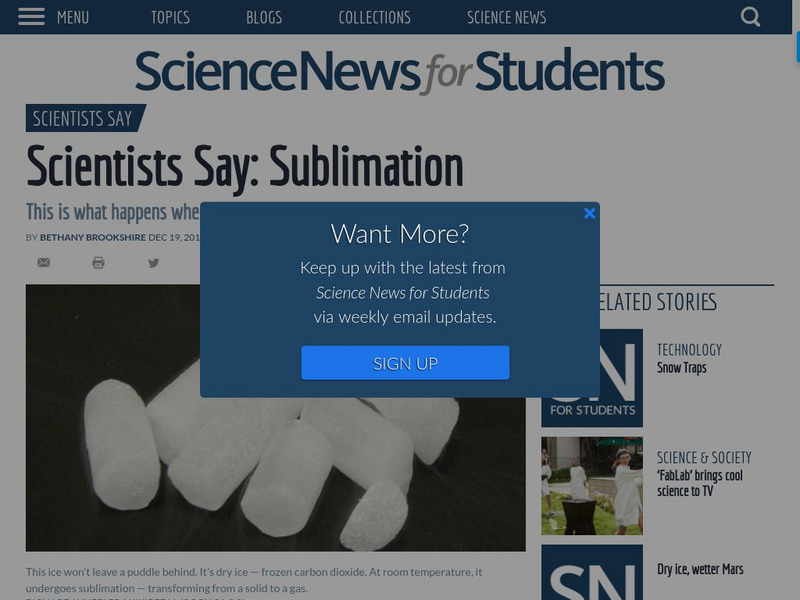Society for Science and the Public
Science News for Students: Quake Leaves Destruction, Fear
Discusses the triple disaster that hit Japan on March 11, 2011, with first an earthquake, then a tsunami, followed by the Fukushima nuclear disaster. Explains some of the basic science behind nuclear fission.
Society for Science and the Public
Science News for Students: Science Loses Out When Ice Caps Melt
Discusses the melting of mountain ice caps from climate change, and how this represents the loss of valuable historical data that disappears as the ice layers melt away. [February 2, 2009]
Society for Science and the Public
Science News for Students: Shoulder Bones Fuel Debate
A shoulder blade was recently discovered that belonged to a 3-year-old humanlike female who lived more than 3 million years ago. Scientists are studying the fossil to learn whether the creature climbed trees.
Society for Science and the Public
Science News for Students: Sleepless at Sea
Can you go for a month without sleeping? Most mammals can't, but scientists have found some marine mammals that do. Find out why some orcas and dolphins don't sleep for weeks at a time.
Society for Science and the Public
Science News for Students: Small but Wise
Describes the WISE Project, which has an infrared telescope orbiting the Earth taking photographs of never before seen areas of space.
Society for Science and the Public
Science News for Students: So Many 'Earths'
Article reports on the recent discovery that many suns in the universe host "Earth-like" planets. Includes a vocabularly list.
Society for Science and the Public
Science News for Students: Superslim Silicene
Discusses research being done with silicene, which is silicon that is one atom thick. Silicene is compared to graphene, both of which have the potential for sparking future innovations in electronics.
Society for Science and the Public
Science News for Students: Swirling Seas of Plastic Trash
Describes the multitude of plastic trash scientists have found on a beach in Hawaii and in the oceans. Explains what a gyre is, and how plastic trash gets trapped in the eye of a gyre. Looks at the serious impact plastic materials have...
Society for Science and the Public
Science News for Students: These Gems Make Their Own Way
Discusses past efforts to make artificial gemstones, the different methods used to make them today, and possible applications for this technology. (Date of article: May 25, 2010)
Society for Science and the Public
Science News for Students: Tsunami's Trek Traced in the Sky
Discusses what scientists learned about tsunamis from photographs of the skies taken at the time of Japan's tsunami in March 2011, and how this information might be used in the future to predict an impending tsunami. [July 6, 2011]
Society for Science and the Public
Science News for Students: Undercover Detectives
Describes how terahertz radiation, or T-rays, are used to detect hidden objects, including revealing a hidden painting, illegal materials in a piece of luggage, and defects on a space shuttle.
Society for Science and the Public
Science News for Students: A Very Good Blast From the Past
Describes the importance of laser technology to modern life, how the laser was invented, how lasers work, and what we can expect in the future from laser technology. [Date of Article: October 27, 2010]
Society for Science and the Public
Science News for Students: Warm Lava on a Hot Planet
Describes scientific research into volcanic activity on the surface of Venus. Using information transmitted from the orbiting Magellan spacecraft, data is collected. Includes a glossary of vocabulary terms. [ November 8, 2010]
Society for Science and the Public
Science News for Students: Watching Our Seas Rise
Ocean levels are increasing around the world. Find out why this type of climate change has scientists concerned.
Society for Science and the Public
Science News for Students: The Newest Elements Finally Have Names
Nihonium? Tennessine? These aren't body parts or medicines. They're among the names just given to the four newest superheavy elements.
Society for Science and the Public
Science News for Students: Cool Jobs: Wet and Wild Weather
How's the weather? Forecasts rely on scientists and engineers who collect and interpret data gathered on the ground, in the sky and way up in space.
Society for Science and the Public
Science News for Students: Concerns About Earth's Fever
Burning fossil fuels is causing the planet to heat up, causing weather patterns to change, sea levels to rise and diseases to spread. Scientists are concerned with the rising temps of Earth.
Society for Science and the Public
Science News for Students: Carbon Dioxide Levels Rise Fast and High
The buildup of carbon dioxide in the atmosphere is rising faster than at any time since dinosaurs roamed the Earth. The burning of fossil fuels is largely to blame.
Society for Science and the Public
Science News for Students: Cool Jobs: Linking Animal Health to Human Health
Scientists who watch out for diseases in wild animals also can play a role in keeping people from getting sick. Check out this Cool Job.
Society for Science and the Public
Science News for Students: Peacock Spider's Radiant Rump Comes From Teeny Tiny Structures
Male peacock spiders have highly colored hind ends that they shake to attract females. Scientists have now figured out the physics responsible for those hues.
Society for Science and the Public
Science News for Students: Clouds on Jupiter Run Surprisingly Deep
Scientists have recently observed a unique feature of the clouds on Jupiter. Find out what they've discovered.
Society for Science and the Public
Science News for Students: Earth Breaks Heat Record for Third Year Straight
Climate change and heat from a strong El Nino played roles in making 2016 the hottest year on record. Understand the specific impacts of climate change.
Society for Science and the Public
Science News for Students: Massive Ice Shelf Is Poised to Break Off of Antarctica
Uh oh! A fast-growing crack in Antarctica's Larsen C ice shelf could soon release a truly huge hunk of ice into the ocean.
Society for Science and the Public
Science News for Students: Scientists Say: Sublimation
Sublimation is what happens when matter goes straight from solid to gas. Check out the details of the process.


